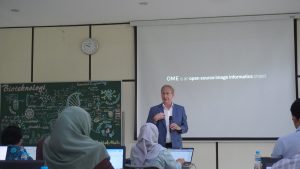The Doctoral Program in Biotechnology, Graduate School of Universitas Gadjah Mada, in collaboration with the Biotechnology Research Center, organized a discussion session and guest lecture on Monday, September 29, 2025, with Dr. Mahmood Ahmed, Chair of Medicinal Chemistry and Head of the Innovative Targets Portfolio at the Drug Discovery Unit (DDU), University of Dundee.
Dr. Mahmood, who also serves as Interim Associate Dean for Enterprise and Economic Transformation, joined the School of Life Sciences, University of Dundee, in 2024. With extensive experience in pharma, biotech, and academia—including roles at GSK (UK), the establishment of a drug discovery center in Singapore, academic entrepreneurship, and co-founding two biotechnology companies—he has contributed to the progression of multiple clinical stage assets and brings deep expertise in translational research.
The academic discussion was attended by Prof. dr. Siti Malkhamah, M.Sc., Ph.D. (Dean of the Graduate School UGM), Dr. Tri Rini Nuringtyas, M.Sc. (Head of the Doctoral Program in Biotechnology), Dr. Dini Wahyu Kartika Sari, M.Sc. (Head of the Master’s Program in Biotechnology), Prof. Yekti Asih Purwestri, Ph.D. (Head of the Biotechnology Research Center), Dr. Dewi Kartikawati Paramita (Secretary of the Biotechnology Research Center), and faculty members of the Biotechnology Study Program.
The meeting identified key areas for collaboration within the framework of the Transnational Education (TNE) Exploratory Grant funded by the British Council, a joint initiative between the University of Dundee’s School of Life Sciences and UGM’s Graduate School. Both institutions agreed to initiate capacity building programs to enhance the competencies of doctoral and master’s students, as well as faculty members, particularly in bridging the gap between early-stage academic research and translational applications in drug discovery.
Following the discussion, Dr. Mahmood delivered a general lecture titled “Translating Research Findings to Patient Impact”, moderated by Dr. Dewi Kartikawati Paramita. The lecture was attended by doctoral and master’s students of Biotechnology, as well as undergraduate students from the Faculty of Pharmacy, UGM.
Dr. Mahmood highlighted pathways and strategies to accelerate the translation of laboratory findings into clinical impact. The session was highly interactive, with students—especially from the Master’s and Doctoral programs—actively asking questions on how to navigate challenges in translational research and create smoother transitions from academic innovation to patient therapies.
This activity strongly contributes to the achievement of the Sustainable Development Goals (SDGs). By advancing innovative approaches in drug discovery, it supports good health and well-being (SDG 3). Through capacity building and knowledge exchange, it enhances quality education (SDG 4) for graduate students and faculty. The collaboration also promotes innovation and infrastructure in biotechnology (SDG 9), ensuring that scientific research is connected to industrial application. Most importantly, it strengthens international partnerships (SDG 17), highlighting the joint commitment of UGM and the University of Dundee to contribute to global health challenges through research and education.















